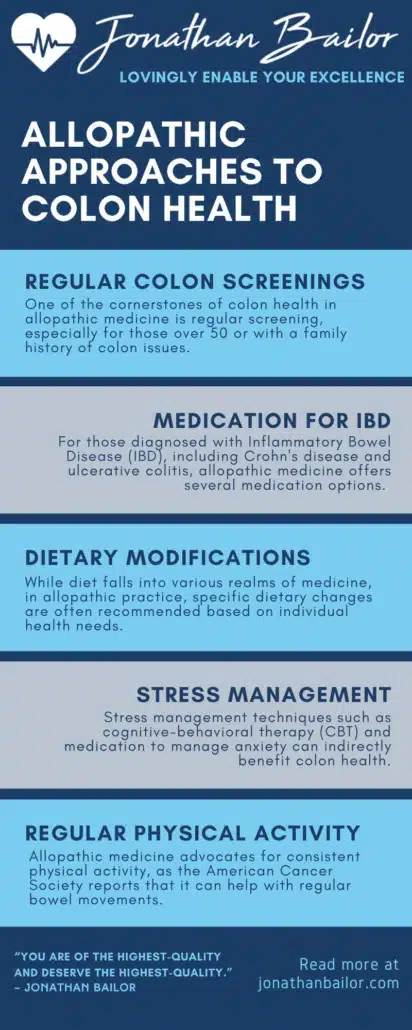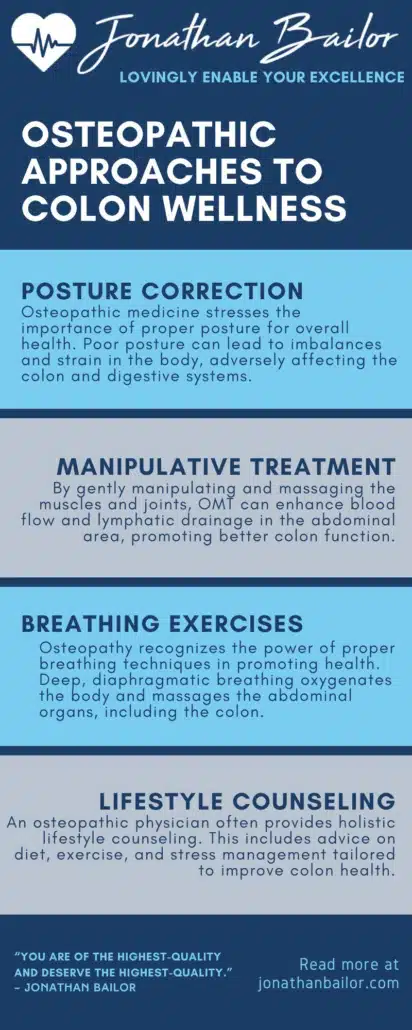Uncovering Wellness: 21 Proven Strategies for Colon Health
Setting out to improve one’s health can often seem like trying to find a way through a maze without any guidance. Understanding where to begin can be daunting, especially when it comes to something as essential yet often overlooked as colon health. But fear not, as we take this journey together, one step at a time, towards a healthier you.
By the way if you want to help your colon more then check out our Colon Health: 24 Tips to Reduce the Risk of Colon Issues and 12 Best Colon-Cleansing Foods to Add to Your Diet guides!
Colon issues might not be the most glamorous topic, but they are crucial to our overall well-being. After all, our colon plays a pivotal role in not only digestion but also in our immune system and general health. And while there’s no magic bullet for perfect health, there are several evidence-based treatments and practices that can significantly reduce the risk of colon issues.
Consider this: Our body is an intricate ecosystem requiring balance and care. Just like a well-tended garden thrives, our bodies, too, flourish with the right nourishment and attention. And the good news is that taking care of our colon’s health isn’t as complicated as it might seem. It’s about making small, manageable changes that add up to a big difference in how we feel and function.
The upcoming sections of this Colon Health article with Jonathan Bailor, we will explore scientifically backed, practical strategies to support and enhance your colon health. These aren’t just abstract concepts, but real, actionable steps that can fit into your daily life. Whether it’s tweaking your diet, incorporating specific types of exercise, or understanding the role of hydration and stress management, each point offers a piece of the puzzle to help you build a stronger foundation for your health.
Remember, the goal here isn’t to overhaul your life overnight. It’s about making incremental changes that are sustainable and effective. As you read through these strategies, think of them as tools in your wellness toolkit, each serving a purpose in maintaining and improving your colon health.
As you find value in these tips, consider sharing them with friends and family. After all, health is a journey best traveled together, and sometimes the most profound care we can offer is through sharing knowledge that can transform lives.
So, let’s embark on this journey together, exploring these 21 evidence-based treatments to nurture and protect one of our body’s most vital systems.
Empowering Health: Allopathic Approaches to Colon Wellness
Finding a way to maintain a healthy colon can often seem like solving a complicated puzzle, but it doesn’t have to be like that. In the realm of allopathic (Western) medicine, there are several reliable solutions that can play a vital role in maintaining colon health.
These medically verified approaches, grounded in scientific research and clinical practice, offer a pragmatic and effective route to enhancing colon wellness.
1. Regular Screening and Colonoscopies
One of the cornerstones of colon health in allopathic medicine is regular screening, especially for those over 50 or with a family history of colon issues. Colonoscopies allow doctors to identify and remove polyps before they turn cancerous. It’s a proactive approach, like using a roadmap to avoid potential roadblocks in your health journey.
Early detection through these screenings is crucial and can significantly reduce the risk of colon cancer and colorectal cancers.
2. Medication for Inflammatory Bowel Disease (IBD)
For those diagnosed with IBD, including Crohn’s disease and ulcerative colitis, allopathic medicine offers several medication options. These include anti-inflammatory drugs, immune system suppressors, and biologics, which target specific pathways in the immune system.
These medications help maintain normal colon function and prevent complications by reducing inflammation and managing symptoms.
3. Dietary Modifications Under Medical Guidance
While diet falls into various realms of medicine, in allopathic practice, specific dietary changes are often recommended based on individual health needs. This may include increasing fiber intake through certain fruits, vegetables, and legumes while managing fat and red meat consumption.
A dietitian or healthcare provider can offer tailored advice, ensuring dietary changes complement overall treatment plans.
4. Stress Management Techniques
Allopathic medicine recognizes the link between stress and colon health. Stress management techniques such as cognitive-behavioral therapy (CBT) and medication to manage anxiety can indirectly benefit colon health.
These approaches address the body’s stress response, which, when unmanaged, can exacerbate gastrointestinal symptoms.
5. Regular Physical Activity
Regular exercise is a cornerstone of maintaining overall health, including colon health. Allopathic medicine advocates for consistent physical activity, as the American Cancer Society reports that it can help with regular bowel movements and can help prevent colon cancer. Exercise doesn’t have to be strenuous; even moderate activities like walking can be highly beneficial.
Each of these approaches offers a valuable tool in your wellness toolkit, reinforcing the importance of a holistic approach to health. Combining these allopathic solutions with a lifestyle supporting overall well-being sets the stage for a healthier, more vibrant life. Remember, your health journey is personal, and these medically endorsed strategies are here to guide you along the way.

Feeling Better Is Priceless, That's Why We Don't Put A Price On It!
“It’s Like A Free and Medically Valid Version of Noom and Weight Watchers Online”
~ Dr. Doctor Matthew Oleshiak, MD
Click the 'LEARN MORE' button below for free lifetime access to the fast fix program developed by Jonathan and top Ivy League Medical Doctors
LEARN MOREP.S. It's not a free trial. It's not part of the program for free. The entire program is free, forever, for real! No credit card needed.
Nurturing Wellness: 6 Naturopathic Paths to Colon Health
Embarking on a journey to better colon health, the naturopathic approach offers a harmony of nature and science. It’s about listening to our body’s natural rhythms and supporting them with time-honored, natural remedies.
These six naturopathic solutions focus on holistic well-being, treating the body as an interconnected system and gently nudging it towards better health.
1. Probiotic-Rich Foods
The gut flora, a complex community of microorganisms in our digestive system, plays a crucial role in colon health. Naturopathic solutions emphasize the importance of probiotic-rich foods like yogurt, kefir, and fermented vegetables.
These foods support a healthy balance of gut bacteria, promote optimal digestion and nutrient absorption, and may help prevent and manage conditions like irritable bowel syndrome (IBS).
2. Herbal Remedies for Digestion
Herbs like ginger, peppermint, and slippery elm are celebrated in naturopathic medicine for their digestive benefits. Ginger can help with nausea and promote healthy digestion, while peppermint soothes the digestive tract and can relieve symptoms of IBS. Slippery elm, with its mucilage content, coats and soothes the gut lining, aiding in managing conditions like gastritis and acid reflux.
3. Adequate Hydration with Herbal Teas
Staying well-hydrated is key to maintaining colon health. Naturopathic practices not only encourage ample water intake but also the use of herbal teas like chamomile or fennel, which can have soothing effects on the digestive system.
These teas provide hydration while also offering the therapeutic benefits of herbs.
4. High-Fiber Natural Foods
A diet rich in natural, high-fiber foods such as fruits, vegetables, legumes, and nuts is central to naturopathic colon care. Fiber aids in regular bowel movements and is essential for a healthy gut. Interestingly, a lack of fiber intake has been shown to increase colorectal cancer risk.
Unlike processed fiber supplements, these natural sources offer a symphony of nutrients beneficial for overall health.
5. Stress Reduction Techniques
Naturopathic medicine recognizes the deep connection between stress and digestive health. Techniques like mindfulness, meditation, and yoga are encouraged to manage stress.
These practices not only soothe the mind but also positively influence gut health, reducing the likelihood of stress-related digestive issues.
6. Regular Physical Movement
Consistent, gentle physical activity is a cornerstone of naturopathic health. Activities like walking, swimming, or yoga support bowel regularity and overall digestive health. This approach to exercise is about finding a balance that invigorates the body without overstressing it.
Incorporating these naturopathic solutions into your lifestyle is like nurturing a garden; it’s a gradual process that yields long-term benefits. Each of these practices offers a step towards a healthier, more harmonious life, emphasizing prevention and the nurturing power of nature.
Remember, the journey to health is deeply personal, and these naturopathic paths are here to guide and support you in your quest for wellness.

Harmonizing Health: Osteopathic Approaches To Colon Wellness
In osteopathic medicine, the focus is on treating the whole person, not just the symptoms. This holistic approach recognizes the interconnectedness of all body systems, including the colon. Osteopathic solutions emphasize the balance and integration of structure and function, offering unique and gentle ways to enhance colon health.
Here are four osteopathic approaches that can guide you toward a harmonious state of well-being.
1. Osteopathic Manipulative Treatment (OMT)
This key osteopathic practice involves using hands-on techniques to diagnose, treat, and prevent illness or injury. By gently manipulating and massaging the muscles and joints, OMT can enhance blood flow and lymphatic drainage in the abdominal area, promoting better colon function and alleviating discomfort caused by conditions like constipation and bloating.
2. Posture Correction
Osteopathic medicine stresses the importance of proper posture for overall health. Poor posture can lead to imbalances and strain in the body, adversely affecting the colon and digestive systems.
Osteopathic physicians can guide you in correcting postural imbalances, which can alleviate pressure on the abdomen and improve colon function.
3. Breathing Exercises
Osteopathy recognizes the power of proper breathing techniques in promoting health. Deep, diaphragmatic breathing oxygenates the body and massages the abdominal organs, including the colon.
This type of breathing can aid in stimulating digestive processes and promoting the movement of waste through the colon.
4. Lifestyle Counseling
An osteopathic physician often provides holistic lifestyle counseling. This includes advice on diet, exercise, and stress management tailored to improve colon health.
The focus is on creating a lifestyle that supports the body’s natural ability to heal and maintain balance, recognizing that each person’s needs and responses are unique.
Each osteopathic solution offers a gentle yet effective way to support and enhance colon health. It’s about tuning into your body’s natural rhythms and supporting them in a way that brings balance and wellness.
Remember, the journey to health is a personal one, and these osteopathic approaches are here to help you find your path to a healthier, more harmonious life.

Embracing Harmony: Eastern and Alternative Medicine for Colon Health
In Alternative and Eastern Medicine, the focus is on harmonizing the body’s energy, drawing upon centuries-old wisdom and natural practices. These approaches consider the body an interconnected system, where maintaining balance is key to health and well-being.
Here are six solutions from these traditional practices, each offering a unique pathway to support and enhance colon health.
1. Acupuncture for Digestive Health
Acupuncture, a cornerstone of Traditional Chinese Medicine, involves the insertion of fine needles into specific points on the body to balance energy flow. When applied for colon health, acupuncture can help regulate digestive function, alleviate bloating, and improve bowel movement regularity.
It’s a gentle, non-invasive way to address digestive imbalances and encourage the body’s natural healing processes.
2. Ayurvedic Dietary Adjustments
Ayurveda, the ancient Indian system of medicine, emphasizes the importance of diet in maintaining health. Ayurveda suggests incorporating easily digestible, warm, and nourishing foods like cooked vegetables, soups, and herbal teas for colon well-being.
This approach is about understanding your body type, or ‘dosha,’ and adjusting your diet accordingly to support digestive health and overall balance.
3. Qi Gong for Energy Flow
Qi Gong, a practice combining movement, meditation, and controlled breathing, is known for enhancing life energy, or ‘Qi.’ For colon health, specific Qi Gong exercises can stimulate the abdomen, enhancing energy flow to the digestive organs.
This practice not only strengthens the body but also calms the mind, promoting a state of balance that is beneficial for colon health.
4. Herbal Remedies in Traditional Chinese Medicine (TCM)
TCM utilizes a variety of herbal formulas to treat digestive issues. Herbs like ginger, licorice, and peppermint are commonly used to soothe the digestive tract, reduce inflammation, and promote healthy bowel movements.
These herbs are often combined in specific formulas tailored to the individual’s needs, offering a personalized approach to keeping your colon healthy.
5. Yoga for Digestive Wellness
Yoga, with its emphasis on holistic well-being, offers specific poses or ‘asanas’ that can improve digestion and colon health. Poses like the ‘Twisting Cobra’ or ‘Wind-Relieving Pose’ massage the abdominal organs, promoting movement and reducing discomfort.
Regular yoga practice not only aids in physical well-being but also in stress reduction, which is beneficial for digestive health.
6. Moxibustion for Vitality and Balance
Moxibustion, a traditional therapy used in conjunction with acupuncture, involves burning dried mugwort at particular points on the body. This technique is believed to invigorate the flow of ‘Qi’ in the body and enhance blood circulation.
When applied to areas related to digestive health, moxibustion can help alleviate constipation and regulate bowel movements.
Each of these ancient practices offers a pathway to better health, embracing the wisdom of centuries and the healing power of nature. As you explore these alternative and Eastern medicine solutions, remember that the journey to well-being is as much about nurturing the spirit as it is about caring for the body.
Let these time-honored practices guide you to a state of balance and harmony in your quest to keep your colon healthy.

FAQ: Navigating the Essentials of Lower Colon Health
1. What are the key functions of the lower colon?
The lower colon, primarily comprising the descending and sigmoid colons, plays a crucial role in our digestive process. Its primary function is to absorb water and salts from the material that has not been digested as food and to store waste until it can be expelled.
This process is essential for maintaining water balance in the body and for the formation of stools. The health of the lower colon is vital for regular bowel movements and overall digestive well-being.
2. How can I tell if my lower colon is healthy?
Indicators of a healthy lower colon include regular and comfortable bowel movements, stool that is well-formed but not hard, and a lack of persistent digestive discomfort such as bloating or pain. Regularity can vary from person to person, but generally, having bowel movements anywhere from three times a day to three times a week is considered normal.
If you experience consistent changes in bowel habits, discomfort, or unusual symptoms, it’s important to consult a healthcare professional.
3. What are common issues that can affect the lower colon?
Common issues affecting the lower colon include constipation, where stool passes too slowly through the digestive tract, causing it to become hard and dry. Other problems include irritable bowel syndrome (IBS), which can cause a variety of symptoms, including cramping, abdominal pain, bloating, gas, and diarrhea or constipation. Conditions like diverticulitis and colon cancer also impact the lower colon and require medical attention.
4. Can diet and lifestyle changes help keep the colon healthy?
Absolutely. A healthy diet rich in fiber from fruits, vegetables, and legumes helps form soft, bulky stool that is easier to pass, reducing the risk of constipation and the risk factors for colon issues. Staying well-hydrated is equally important, as water works with fiber to aid digestion and maintain bowel health. Regular physical activity also encourages regular bowel movements. Additionally, managing stress and getting adequate sleep can positively affect your digestive health. Conversely, overconsumption of processed meats, alcohol, and sugary or processed foods can lead to an increased risk of colon issues.
5. When should I seek medical advice for lower colon health?
It’s advisable to seek medical attention if you experience persistent changes in your bowel habits, such as chronic diarrhea or constipation, blood in the stool, unexplained abdominal pain, or significant unintentional weight loss.
Early medical intervention can be crucial in addressing potential issues in the lower colon, including screening for colorectal cancer, especially if you’re over 50 or have a family history of digestive issues. Remember, proactive health care is key to maintaining your overall well-being.
Embracing Collective Wellness: A Journey to Share
As we conclude this exploration of colon health, embracing the wisdom of various medical traditions, remember that good health is a journey we don’t have to travel alone. Sharing this knowledge can be a powerful way to care for our loved ones.
I encourage you to spread the word if you’ve found value in these insights. Share this with friends and family through social media or a thoughtful email. Let’s build a community of health and awareness together, helping each other along the path to well-being. Your role in this journey is not just about self-care but also about sharing care.
Feeling Better Is Priceless, That's Why We Don't Put A Price On It!
“It’s Like A Free and Medically Valid Version of Noom and Weight Watchers Online”
~ Dr. Doctor Matthew Oleshiak, MD
Click the 'LEARN MORE' button below for free lifetime access to the fast fix program developed by Jonathan and top Ivy League Medical Doctors
LEARN MOREP.S. It's not a free trial. It's not part of the program for free. The entire program is free, forever, for real! No credit card needed.




